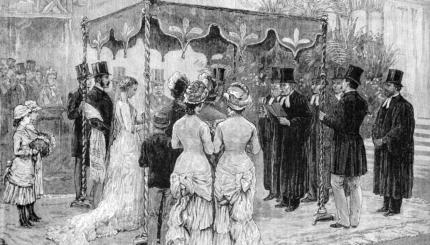My first novel,
The Wedding Beat
, was loosely based on my experience as a single Jewish guy writing the Vows wedding column at The New York Times.(“Always the wedding columnist and never the groom,” is how the New York Observer described me.) There are a lot of things I learned that didn’t make it into the book, and here are a few of them:
1. MEN ARE ALSO FROM VENUS
Beneath the stubble and the SportsCenter addiction, most men are as confused, vulnerable, and romantic as women when it comes to falling in love.
I’m not sure where people got the idea that romance is primarily a female thing. When it comes to grand romantic gestures, from sweeping someone away for a weekend in Paris to getting down on one knee on a white sand beach, there’s usually a guy involved.
2. A RECEPTION IS A RECEPTION IS A RECEPTION
If you’re in the midst of planning a wedding party, trust me when I say no one will remember the color of the napkins.
Every wedding ceremony has a personal element unique to the bond of the two people getting married, but receptions tend to blend together. Some are fancier. Some are quirkier. But once the jackets are off and the guests are boogying down on the dance floor, the Rockefellers don’t look much different from the Rubinsteins. And I can say that with assurance because I covered two Rockefeller weddings—and one of them married a Rubinstein.
3. THERE’S A BIG DIFFERENCE BETWEEN ATTENDING A WEDDING AND WORKING AT ONE
The New York Times has a strict policy about accepting anything that could be construed as a gift. So when I go to a wedding I don’t eat. I don’t drink. Bill Cunningham, the iconic Times photographer (and the subject of the documentary film
Bill Cunningham New York
) has said he doesn’t even accept water.
Working at a party is precisely that. Working. Watching other people enjoy a gourmet meal is a fat-free and frisson-free experience. As an added bonus, when guests see me with a pen and pad in my hand, they often mistake me for a waiter and give me their drink orders.
4. SAYING “I DO” ISN’T WRITTEN IN STONE – OR NECESSARILY EVEN IN INK
Oddly, a lot of people who make submissions to The New York Times wedding section aren’t having a legal marriage ceremony. And I’m not talking about gay weddings. In some cases, the bridal couple has previously eloped and never told anyone. In other cases, they’re interested solely in the party, but they haven’t yet decided if they want to make a legal commitment to each other. (This really happens.)
There are also numerous couples who want their ceremony performed by someone who isn’t legally sanctioned to marry them, but these couples don’t want the hassle of a separate civil ceremony at City Hall to make the marriage legal. This is what divorce lawyers’ dreams are made of.
5. GREAT LOVE IS NOT PERFECT LOVE
I find the healthiest relationships are the ones based on mutual respect—not just for each other’s virtues but also for each other’s flaws. Couples that can acknowledge (and laugh) about their partner’s imperfections (and their own) seem to have the strongest foundation.
Love stories that are too good to be true usually are, and when I hear someone describe their mate as “perfect,” it’s a red flag. “Perfect” is not an option in politics or marriage. A truly happy bride isn’t someone in a state of bliss but rather someone looking forward to what’s coming next.
6. HAPPINESS IS A CHOICE
I think people like reading Vows columns for the same reason I like writing them. They affirm life by showing that love can happen at any time, at any place and at any age.
So many things belong to youth: such as time, health, and Justin Bieber hair. But it turns out that love isn’t one of them. Happiness is always possible. As long as you’re alive, there’s always hope that something new and exciting is around the corner.
Falling in love is a little like writing a book. You can feel a spark about a person or an idea. The trick is paying attention to that spark and choosing to pursue it.
The Visiting Scribes series was produced by the Jewish Book Council‘s blog, The Prosen People.
The Jewish world is full of debates. Get the latest in MyJewishLearning’s weekly blogs newsletter.


